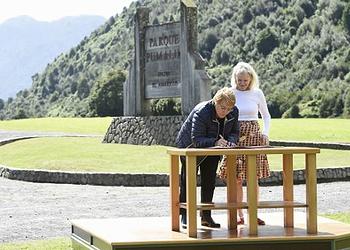
SANTIAGO, Chile, March 17, 2017 (ENS) – After the largest land donation in history from a private entity to a country, Chilean President Michelle Bachelet and Tompkins Conservation leader Kristine McDivitt Tompkins Wednesday signed a pledge to expand Chile’s national parkland by roughly 4,500,000 hectares (11 million acres).
The donation will help create the Route of Parks, a planned 17-park network spanning more than 1,500 miles of Chile’s Patagonia region from Puerto Montt to Cape Horn for the enjoyment of nature-loving Chileans, global adventurers and tourists from around the world.
The Route of Parks will safeguard Patagonia’s wilderness and open the south of Chile to ecotourism development, with the potential to generate US$270 million in annual revenue. It is expected to employ up to 43,000 people in the region.

“The signing of this historic pledge reflects a desire to continue and deepen Chile’s tradition of conservation,” said President Bachelet during the ceremony at Pumalin Park. “Today, alongside Kris, I am honored to see how everything has come together. We are bequeathing to the country the greatest creation of protected areas in our history.”
Pumalín Park has been a private park with public access about the size of the state of Rhode Island established by Douglas Tompkins.
“Today, with the transfer to the Treasury of more than 407,000 hectares by the Pumalín Foundation and other donor entities, we see the birth of the Network of National Parks of Patagonia, which, together with protected lands, will allow us to preserve more than 4,500,000 hectares, distributed in eight areas,” the president said.
Chile will contribute 950,000 hectares, distributed in the regions of Los Lagos, Aysén, Magallanes and in the Chilean Antarctic.
From all these lands, the country will create three new national parks: Pumalín, Melimoyu and Patagonia.
Chile also is expanding three existing national parks: Hornopirén, Corcovado and Isla Magdalena.
The government also will expand and reclassify the National Forest Reserve Alacalufes National Park and reclassify the National Reserve Forest Reserve Cerro Castillo, the Cochrane Lake Forest Reserve and the Jeinimeni Lake National Reserve to provide greater protection to these lands.
“We are affirming that as humans we can, and have the duty, to find ways to relate harmoniously with nature,” said Bachelet.

Kristine and Douglas (1943–2015) Tompkins, American business leaders who made their fortunes from clothing brands The North Face, Esprit, and Patagonia, Inc., retired from their companies to live in Chile more than 20 years ago. There they devoted their funds, time, and energy to battle the crisis of biodiversity loss.
They concluded that creating large national parks where evolutionary processes could take their course was the most effective way to combat this loss. So, they spent years purchasing and restoring land around Chile to create new parks with the goal of giving the land back to the Chilean government for protection.
“I wish my husband Doug, whose vision inspired today’s historic pledge, were here on this memorable day. Our team and I feel his absence deeply,” said Kristine Tompkins of her husband who passed away in 2015 after a kayaking accident on General Carrera Lake in Chile.
“But I know that if Doug were here today, he would speak of national parks being one of the greatest expressions of democracy that a country can realize, preserving the masterpieces of a nation for all of its citizenry,” she said.
President Bachelet invoked the Chilean poet Pablo Neruda, who she quoted as writing in his memoirs, “Who does not know the Chilean forest, does not know this planet.”
“And Douglas Tompkins knew these extensions in depth and detail,” said Bachelet. “He loved these lands without the need for a flag, he knew how to love the whole planet, and worked hard to ensure that his conservation was assured.”

“Here’s our vision,” the Tompkins couple wrote on the Tompkins Conservation Facebook page. “Big, secure, wild landscapes where all the native plants and animals thrive. Nearby, human communities flourish, their economic vitality linked to the vibrant good health of the natural world surrounding them.”
“For two decades, our team has been creating national parks, recovering imperiled wildlife, implementing ecological agriculture, promoting healthy local communities, and supporting leading-edge activism. We develop our diverse programs around each unique place in which we work, but all efforts lead back to this common vision,” they write on Facebook.
“We are deeply grateful for the likeminded partners who enable us to work effectively on a biologically significant scale.”
The Route of Parks project will expand Chile’s percentage of protected land from 19 percent to 29 percent
To support the government in this endeavor, Tompkins Conservation and key partners is committing to creating a Chilean-based Friends of National Parks foundation for ongoing park support.
President Bachelet praised the agreement on Twitter, saying, “Great day for Chile! The vision of the Tompkins, and the will and contributions of the State, will create the network of National Parks of Patagonia.”
Copyright Environment News Service (ENS) 2017. All rights reserved.
© 2017, Environment News Service. All rights reserved. Content may be quoted only with proper attribution and a direct link to the original article. Full reproduction is prohibited.
